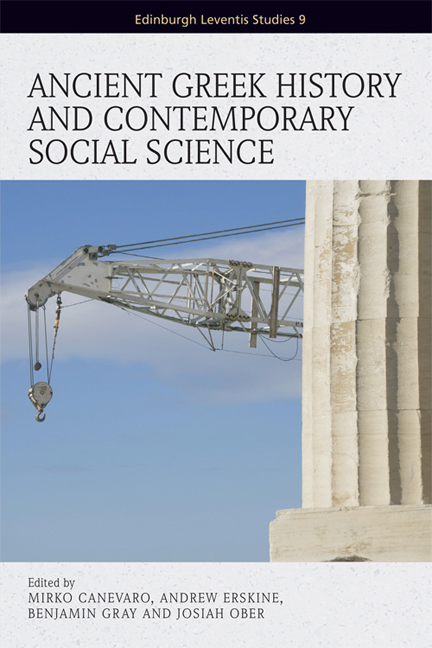53 results
(M.) LANDAUER Dangerous Counsel: Accountability and Advice in Ancient Greece. Chicago and London: The University of Chicago Press, 2019. Pp. viii + 240, illus. £72. 9780226654010.
- Part of
-
- Journal:
- The Journal of Hellenic Studies / Volume 142 / November 2022
- Published online by Cambridge University Press:
- 11 April 2023, pp. 374-376
- Print publication:
- November 2022
-
- Article
-
- You have access
- HTML
- Export citation
27 - Inequality
- from Empirical Approaches
-
-
- Book:
- The Cambridge Companion to the Ancient Greek Economy
- Published online:
- 21 July 2022
- Print publication:
- 04 August 2022, pp 404-420
-
- Chapter
- Export citation
Democracy Against Liberalism: Its Rise and Fall. By Aviezer Tucker. Cambridge: Polity Press, 2020. 200p. $59.95 cloth, $19.95 paper.
-
- Journal:
- Perspectives on Politics / Volume 20 / Issue 1 / March 2022
- Published online by Cambridge University Press:
- 09 March 2022, pp. 302-303
- Print publication:
- March 2022
-
- Article
- Export citation
Index
-
- Book:
- Ancient Greek History and Contemporary Social Science
- Published by:
- Edinburgh University Press
- Published online:
- 06 May 2021
- Print publication:
- 06 June 2018, pp 581-591
-
- Chapter
- Export citation
PART VI - TECHNOLOGY AND INNOVATION
-
- Book:
- Ancient Greek History and Contemporary Social Science
- Published by:
- Edinburgh University Press
- Published online:
- 06 May 2021
- Print publication:
- 06 June 2018, pp 483-484
-
- Chapter
- Export citation
Contents
-
- Book:
- Ancient Greek History and Contemporary Social Science
- Published by:
- Edinburgh University Press
- Published online:
- 06 May 2021
- Print publication:
- 06 June 2018, pp v-vii
-
- Chapter
- Export citation
PART IV - WEALTH, POVERTY AND INEQUALITY
-
- Book:
- Ancient Greek History and Contemporary Social Science
- Published by:
- Edinburgh University Press
- Published online:
- 06 May 2021
- Print publication:
- 06 June 2018, pp 313-314
-
- Chapter
- Export citation
PART II - INSTITUTIONS
-
- Book:
- Ancient Greek History and Contemporary Social Science
- Published by:
- Edinburgh University Press
- Published online:
- 06 May 2021
- Print publication:
- 06 June 2018, pp 99-100
-
- Chapter
- Export citation
PART III - BEHAVIOUR
-
- Book:
- Ancient Greek History and Contemporary Social Science
- Published by:
- Edinburgh University Press
- Published online:
- 06 May 2021
- Print publication:
- 06 June 2018, pp 239-240
-
- Chapter
- Export citation
PART V - INTERSTATE RELATIONS
-
- Book:
- Ancient Greek History and Contemporary Social Science
- Published by:
- Edinburgh University Press
- Published online:
- 06 May 2021
- Print publication:
- 06 June 2018, pp 403-404
-
- Chapter
- Export citation
List of Contributors
-
- Book:
- Ancient Greek History and Contemporary Social Science
- Published by:
- Edinburgh University Press
- Published online:
- 06 May 2021
- Print publication:
- 06 June 2018, pp viii-xii
-
- Chapter
- Export citation
PART I - THEORY AND METHOD
-
- Book:
- Ancient Greek History and Contemporary Social Science
- Published by:
- Edinburgh University Press
- Published online:
- 06 May 2021
- Print publication:
- 06 June 2018, pp 13-14
-
- Chapter
- Export citation
Introduction
-
-
- Book:
- Ancient Greek History and Contemporary Social Science
- Published by:
- Edinburgh University Press
- Published online:
- 06 May 2021
- Print publication:
- 06 June 2018, pp 1-12
-
- Chapter
- Export citation
Frontmatter
-
- Book:
- Ancient Greek History and Contemporary Social Science
- Published by:
- Edinburgh University Press
- Published online:
- 06 May 2021
- Print publication:
- 06 June 2018, pp i-iv
-
- Chapter
- Export citation

Ancient Greek History and Contemporary Social Science
-
- Published by:
- Edinburgh University Press
- Published online:
- 06 May 2021
- Print publication:
- 06 June 2018
Chapter 7 - Delegation and Expertise
-
- Book:
- Demopolis
- Published online:
- 20 July 2017
- Print publication:
- 14 July 2017, pp 128-156
-
- Chapter
- Export citation
Chapter 8 - A Theory of Democracy
-
- Book:
- Demopolis
- Published online:
- 20 July 2017
- Print publication:
- 14 July 2017, pp 157-176
-
- Chapter
- Export citation
Chapter 5 - Human Capacities and Civic Participation
-
- Book:
- Demopolis
- Published online:
- 20 July 2017
- Print publication:
- 14 July 2017, pp 77-100
-
- Chapter
- Export citation
Epilogue - Democracy after Liberalism
-
- Book:
- Demopolis
- Published online:
- 20 July 2017
- Print publication:
- 14 July 2017, pp 177-180
-
- Chapter
- Export citation
Contents
-
- Book:
- Demopolis
- Published online:
- 20 July 2017
- Print publication:
- 14 July 2017, pp ix-x
-
- Chapter
- Export citation

